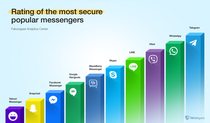

Types of office procrastinators and how to deal with them?
Every person faces procrastination eventually. Besides the fact that precious time is running out because of it, the awareness of your professional worthlessness can lead to severe psychological disorders. You need to understand that procrastination and laziness are quite different things. By procrastinating, a person deliberately postpones urgent business, which later causes guilt and self-blame. This fact further aggravates the situation.
Falcongaze specialists are convinced that psychologically comfortable working conditions are extremely important for ensuring the internal security of your company. That's why, our analysts decided to find out why the phenomenon of procrastination appears and what an employer should do with it.
To begin with, it is important to note the people working for the benefit of your business are your allies, not enemies. Hiring a person, you confirm that his competencies and skills correspond to the stated requirements. Then the natural question arises: why does the employee lose interest and his efficiency decreases? Moreover, there are two non-less important questions. At what moment does it happen? Can you notice that moment? If you have a staff of 20+ people, it is quite difficult to show vigilance or even better to say sensitivity to each employee.
How to understand that your employees are prone to procrastination?
To answer this question, you have to see the whole working day picture of your employees. However, if we are talking about an average or a large-scale company, collecting such information becomes problematic and resource-intensive.
In our opinion, a reasonable solution would be to use an employee activities monitoring system. Today the market offers a variety of solutions with similar functionality. By the way, our product SecureTower has also the function of working time monitoring, which allows you to see how much time the employee has spent on the execution of a task. Also thanks to the keylogger and audio/video monitoring functions as well as screenshots of the desktop, you get a complete picture of the employee's working day.
There are various classifications of procrastinators. Based on them, we made a selection of the most popular, in our opinion, types.
Perfectionist

Why do something if you cannot achieve perfection? This is Perfectionist's argument. However, is it possible to survive with such an approach in a team? The question is ambiguous, even rhetorical. Such an approach is the way to shift responsibility, because a person is not sure that will be able to complete the task perfectly. Mostly because of wallowing in the details, the employee will not even start the essential part.
Dreamer

This type of procrastinator is good at planning. His mind is full of creativity and non-standard approaches. Nevertheless, when it comes to achieving the goals, some difficulties appear. Often, these problems are associated with unreality of the tasks and poor time management skills.
Avoidant

The main problems of Avoidant are the fear of failure and condemnation from colleagues. Such employees will postpone work to the last moment, just not to face criticism. Among the favorite activities of this type procrastinator - updating mail and checking messages. It seems he is working. What is more harmful, he spends a lot of energy on mail reading that gives him the right to have a break with no shame. However, all this rituals keep away the employee from real problems solving.
Deadline lover

Such procrastinators postpone tasks to the point of no return. They do it intentionally. In their opinion, the productive work is possible only in the rush regime. With such a hurry, the quality of the result could be forgotten. On the one hand, it is true that the most interesting solutions may appear in a stressful situation. However, working in this manner on a daily basis is definitely bad option.
Fussy

Constant business and fussiness are the main features of this type. Thus, a person constantly postpones decision-making on important issues and always gets tired of solving secondary tasks. Therefore, a person does not feel satisfaction of the goals achievement. Finally, an employee burns out and the employer is dissatisfied with his low productivity.
How to increase employee's concentration and overcome procrastination?
-
Set priorities
It is necessary for managers to assign tasks according to the priority. Competently composed task with indication of its urgency will give the employee an understanding of the time resource he has. Obviously, it is easy to panic having five pressing issues that need to be solved. However, when they are properly listed in order of urgency with adequate deadlines, the tasks seem no longer such impossible. This advice is very useful for Fussy procrastinators and Perfectionists.
-
Look at things realistically
If a person does not speak foreign languages, he will unlikely be able to conduct a decent presentation for foreign clients. As well as the employee who knows no nuances of the project will not be able to prepare a qualitative report. Setting realistic goals to competent people is a guarantee of the team effectiveness and the psychological health of employees. Thus, it will be easier for you to cope with the Avoidants, because they will have fewer chances to doubt on their proficiency.
-
Motivation is important
Understanding what kind of reward awaits for a person is a vital point. Moreover, it is not about the material component. Yes, high wage is a good motivation. Nevertheless, much more valuable for the employee is feeling of his useful work. You should agree that taking up the work which results you will not see is a dubious pleasure. Therefore, it is worthwhile to set achievable goals for each day. Especially if we are talking about long-term project and you have discovered a Dreamer in the team. You should constantly inform the employee about his work progress assessment. Visibility of the result and its objective assessment will help such employees to do their job better.
-
Planning
If you see that the tasks you have set are often performed at the last minute and their quality is poor, you are definitely dealing with the Deadline lover. In this situation, you can consider Francesco Cerillo planning method. According to this method, the big deadline can be divided into small ones. Breaking time into short 25 minute blocks you form controlled segments, each of them has its own deadline. Moreover, the intervals between the blocks allows an employee to have a rest more frequently.
-
Turn off gadget sound
This is a general advice for any type of procrastinators and for hard workers too. We live in a time when the information flow overwhelms us. How can you concentrate on an important task if the notifications on the smartphone screen are constantly flashing? Sounds distract you and your colleagues. For general emotional peace, we advise you to mute your phone. It is even better to remove it from the table.
-
Clean workplace
Objects ordering in the workplace will order the thoughts and actions as well. It is necessary to free the table from unnecessary items that will catch the eye during the day and detract from the work.
-
Schedule
Ask employees to follow the lunch and technical breaks schedule. They will stop repeated tea drinking, eternal walks to the fridge and back and empty conversations in the smoking room. Of course, everyone needs to have a rest from time to time. For this exactly purpose breaks are created.
It is important for both the employee and the employer to understand there is no a pill healing a person from laziness or giving him extra concentration. However, changing the attitude to the problem can make you feel completely different. An employee should perceive work as new challenges to his professionalism rather than a routine or series of orders from superiors. With such an attitude he will definitely be more productive.







.png)





